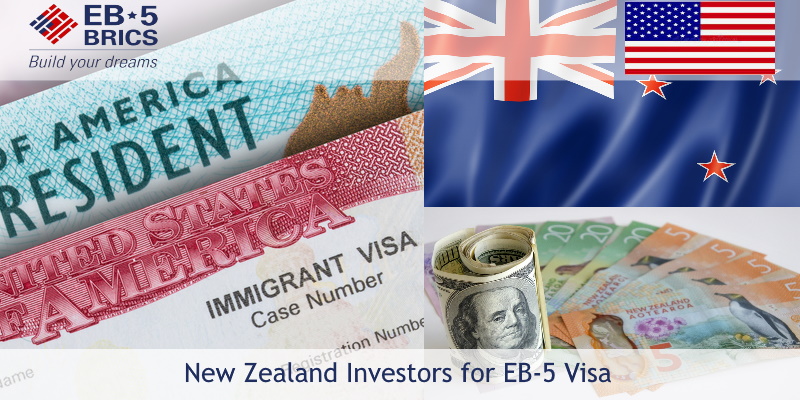 The EB-5 Visa for New Zealand investors is an immigrant investor visa that grants permanent residence (green card) in the United States to eligible applicants. Permanent residence (green card) allows New Zealand investors and their dependents to permanently stay in the United States. The EB5 Visa for New Zealand investors requires a minimum investment that creates at least 10 full-time jobs for U.S. citizens.
The EB-5 Visa for New Zealand investors is an immigrant investor visa that grants permanent residence (green card) in the United States to eligible applicants. Permanent residence (green card) allows New Zealand investors and their dependents to permanently stay in the United States. The EB5 Visa for New Zealand investors requires a minimum investment that creates at least 10 full-time jobs for U.S. citizens.
New Zealand investors do not face backlogs in the application process for EB-5 Visa. The “current” status of the EB-5 Visa for New Zealand investors is an advantage in the growth of the EB-5 market for New Zealand investors. The EB-5 Visa benefits New Zealand investors and their dependents through faster US immigration. The children of New Zealand investors can obtain a U.S. education with a green card. New Zealand investors can invest and set up businesses in the U.S. with the EB5 Visa without sponsorship limitations.
Table of Contents
What is EB-5 Visa for New Zealand Investors?
The EB-5 Visa for New Zealand investors is an immigrant visa that grants permanent residence (green card) in the United States to eligible applicants. Permanent residence (green card) allows New Zealand investors and their dependents to live and work permanently in the United States. The EB5 Visa for New Zealand investors requires a minimum amount invested in a U.S. business. The investment has to generate at least 10 full-time jobs for U.S. citizens.
What are the Benefits of EB-5 Visa for New Zealand Investors?
New Zealand investors and their dependents enjoy the following benefits with an EB-5 Visa.
- Permanent residence in the US. New Zealand investors and their spouses and children can live and work anywhere in the US with a green card.
- Investment in the US. The US provides a stable international market for New Zealand investors to expand their investments and businesses.
- Education in the US. Children under 21 of New Zealand investors can study in the top educational institutions in the US with a green card. These are the benefits enjoyed by children of New Zealand investors as dependents of the EB-5 Visa.
- Study in some of the best institutions in the world without facing restrictions imposed on foreign students.
- Pay 150% to 300% lower tuition fees as compared to foreign students.
- Enjoy more funding and scholarship options as compared to foreign students.
- Study as a day scholar and avoid long separation from family just to obtain a quality education.
- Explore job opportunities without worrying about issues like work permits, sponsorship, processing delays, expiry of visa, or restrictions on job mobility.
- New Zealand investors enjoy greater international mobility through the visa-free travel privileges available to US green cardholders.
What are the Risks of EB-5 Visa for New Zealand Investors?
These are the risks in applying for an EB-5 Visa for New Zealand investors.
- Risk on investment. An EB5 investment does not guarantee a return on capital. The primary benefit of the EB-5 for New Zealand investors is the ability to obtain a U.S. green card.
- Risk on immigration. An EB-5 investment does not automatically result in a U.S. green card. The New Zealand investor needs to meet all the requirements of the EB5 Visa to be granted permanent residence in the US.
- Risk of fraud. Firms or individuals can claim to be migration brokers or immigration consultants. The New Zealand investor should conduct due diligence and research an EB-5 project to ensure its legitimacy and avoid huge losses.
How Long Does it Take to Process an EB 5 Visa for New Zealand Investors?
The petition for an EB5 Visa for New Zealand investors begins with the filing of the Immigrant Petition by Standalone Investor (Form I-526). The processing time of the Immigrant Petition by Standalone Investor (Form I-526) is between 29.5 to 61 months.
Read: Wait times and Investment & Immigration timelines for New Zealand
How Long is an EB5 Visa Valid for New Zealand Investors?
An EB-5 Visa for New Zealand investors grants conditional permanent residence in the U.S. for 2 years. An approved Petition by Investor to Remove Conditions on Permanent Resident Status (Form I-829) grants an unconditional permanent residence in the U.S. for 10 years.
The EB-5 U.S. Immigrant Investor Visa Program is available to residents of New Zealand.
What are the Requirements for an EB-5 Visa for New Zealand Investors?
 These are the EB5 Visa requirements for New Zealand investors.
These are the EB5 Visa requirements for New Zealand investors.
- Investment amount. The “at risk” investment for the EB5 Visa for New Zealand investors can be any of the following.
- The minimum investment is $800,000 (NZ$1,392,670.20 NZD) for a Targeted Employment Area (region with high unemployment rates and rural areas).
- The investment is $1,050,000 (NZ$1,827,891.45 NZD) for a non-Targeted Employment Area.
- Source of funds. New Zealand investors can use any of the following as EB5 funds.
- Inheritance
- Salaries/wages
- Loans from a financial institution or from an individual
- Business profits
- Gifts from an individual
- Job creation. The EB5 Visa for New Zealand investors requires the creation of 10 full-time jobs for American citizens.
The financial criteria for the EB-5 Visa for New Zealand investors are the following.
- Net worth of $1,050,000 (NZ$1,827,891.45 NZD) for an individual or married couple; or
- Minimum of $200,000 (NZ$348,169.80 NZD) in individual income in each of the 2 previous years; or
- Minimum of $300,000 (NZ$522,254.70 NZD) in joint income in each of the 2 previous years; and
- Comparable level of future income and assets
What is the Age Requirement for New Zealand Investors to Get EB-5 Visa?
There’s no age limit. The meaning of this simply is any New Zealand investor qualifies to be an EB-5 investor. However, since a minor probably does not have the assets or income to be eligible as an EB-5 investor on his own, the parents or some other guardian giving him/her the investment amount requires showing the necessary documents to prove the source of funds. Occasionally, a New Zealand investor pursuing an EB-5 visa will be unable to get specific documentation. In such instances, the applicant may file a declaration giving an explanation as to why they are unable to supply the needed documentation.
The only time age matters is if the parent is applying and children are also part of the application as derivatives. They must be under the age of 21 to be included in a parent’s application.
New Zealand EB5 Visa
The EB-5 U.S. The Immigrant Investor Visa Program is available to Kiwi citizens. There is a growing demand for the EB-5 Visa category among Kiwi nationals. If you (or your child) were born in New Zealand, then you can apply for the fast-track Green Card category for the United States through the EB 5 USA Investor Visa Program.
How Much Does an EB-5 Visa Cost for New Zealand Investors?
 These are the costs of an EB-5 Visa for New Zealand investors.
These are the costs of an EB-5 Visa for New Zealand investors.
- EB-5 investment
- $800,000 (NZ$1,392,670.20 NZD) for a Targeted Employment Area
- $1,050,000 (NZ$1,827,891.45 NZD) for a non-Targeted Employment Area
- Form I-526- $3,675 (NZ$6,397.62 NZD)
- Application to Register Permanent Residence or Adjust Status (Form I-485)- $1,140 (NZ$1,984.57 NZD)
- Form I-829- $3,750 (NZ$6,528.18 NZD)
The U.S. Citizenship and Immigration Services (USCIS) allows 10,000 EB-5 visas a year.
The Reserve Bank of New Zealand Act enables the Reserve Bank to intervene in the foreign exchange market It is the regulatory body that has the framework and monetary policy for moving assets and money outside of New Zealand.
How can I Transfer EB-5 Funds from New Zealand?
New Zealand investors need to prove that they invested the minimum amount required by the EB-5 Visa. Form I-526 must show that the EB-5 investment was acquired and transferred lawfully. New Zealand investors have to transfer the EB-5 investment fund into the EB5 project’s escrow account prior to filing Form I-526. An escrow account is an interest-bearing bank account. An escrow account keeps huge sums of money for businesses until all transactions are complete. The escrow agreement should state that the entire amount of required capital will be invested in the EB-5 project. The bank holding the escrow account should show no relationship to the New Zealand investor and the EB-5 project.
What is the Priority Date for EB5 Visa for New Zealand Investors?
The EB-5 Visa for New Zealand investors remains on “current” status according to the U.S. Department of State (DOS) Visa Bulletin. “Current” status means that there is no backlog in the application for EB-5 Visa for New Zealand investors.
How Long Does it Take to Acquire an I-526 Approval for the New Zealand Investor under EB 5?
The USCIS approves all I-526 applications for an EB5 Visa. The processing of I-526 depends on the nature of the case and the service center processing the application. The approval of an I-526 for New Zealand investors can take between 29.5 to 61 months.
How can a New Zealand Citizen Immigrate to the United States Using the EB-5 Program?
The process of immigration for New Zealand investors using the EB-5 Program involves 6 steps.
- Petitioning for an EB-5 Visa. Filing of Form I-526 to the USCIS.
- Applying for an EB5 Visa. Form I-526 must be approved by USCIS prior to applying for the EB5 Visa.
- Applying from overseas. Filing of the Online Immigrant Visa and Alien Registration Application (Form DS-260).
- Applying within the US. Filing of Application to Register Permanent Residence or Adjust Status (Form I-485).
- Granting of EB-5 Visa.
- Obtaining conditional permanent residence. The conditional green card is valid for 2 years for the New Zealand investor and his/her dependents.
- Removing conditions on permanent residence. Form I-829 is submitted to USCIS within the 90-day period prior to the second anniversary as an EB5 investor in the US.
- Gaining lawful permanent residence. A lawful permanent residence (unconditional green card) is valid for 10 years.
What is the EB-5 Visa Statistics for New Zealand Investors?
There were 0 EB-5 Visas released to New Zealand investors in FY 2024 according to the Report of the Visa Office 2024 from the U.S. Department of State (DOS).
What are the Challenges for New Zealand Investors for EB-5?
New Zealand investors face specific challenges when applying for the EB-5 Visa. The first is the ability to meet the minimum investment capital. The New Zealand investor should be prepared to supply the minimum investment and prove a legal source of EB5 funds. The second is the risk of losses in the EB5 investment project. There is no guarantee of capital repayment in the EB5 project. The main benefit of the EB-5 Visa for New Zealand investors is getting permanent residence in the US. The third is the occurrence of fraud schemes that target EB-5 investors. Hiring an EB-5 attorney, consulting the right experts, and working with reputable EB-5 partners help solve these challenges of the EB-5 Program.
What is the Best Project to Invest in with an EB-5 Visa for New Zealand Investors?
An EB-5 project is the U.S. business investment required for an EB-5 Visa for New Zealand investors. Popular EB-5 projects include the real estate and hotel construction industries. An EB-5 Project Related to Real Estate has a readily understandable exit strategy for New Zealand investors. An EB-5 Project Related to Hotel Construction allows for the generation of multiple jobs for Americans.
What Does the Future Hold for EB-5 Investors from New Zealand?
New Zealand investors do not face backlogs in the application for EB-5 Visa. The “current” status of EB5 Visa for New Zealand investors is an advantage in the growth of the EB5 market for New Zealand investors.
What are the Other US Visa Available for New Zealand Nationals?
Immigrant and nonimmigrant visas are available to New Zealand nationals to grant entry to the United States. Immigrant petitions are approved by the USCIS prior to applying for visa approval. The petition is filed by a qualified relative or a potential employer. Nonimmigrant visas are available to foreign citizens who wish to enter the United States temporarily. Nonimmigrant visas are granted to tourists, business people, students, or specialty workers for a particular period of time to accomplish specific purposes.
The following are the US Visas available to New Zealand nationals.
Immigrant Visas
- Family-Based Immigration. For foreign citizens sponsored by an immediate relative who is a U.S. citizen or a U.S. green card holder and is at least 21 years old.
- Fiancé(e) K-1 nonimmigrant visa. For a foreign fiancé(e) of a US citizen. The foreign fiancé(e) is allowed to stay in the U.S. to apply for permanent residency after marriage.
- K-3 Visa. For the foreign spouse of a U.S. citizen traveling to reside in the U.S. while awaiting final completion of their immigration. The spouse’s children can enter the U.S. with a K-4 Visa.
- Employment-Based Immigration. For qualified applicants under the provisions of US immigration law. The EB-5 Visa falls under the Employment Fifth Preference (E5).
- Diversity Visa. For countries with low rates of immigration to the US in the previous 5 years.
- Returning Resident Visa. For permanent residents who have remained outside of the US for more than 1 year, or beyond the validity period of their Re-entry Permit.
Nonimmigrant Visas
- B-1/B-2 Visitor Visa. For people traveling to the US for business or pleasure, or for medical treatment.
- Temporary Worker/Employment or Trainees (H, L, O, P, Q, R). For temporary, nonimmigrant workers petitioned by US employers or agents.
- Student Visa. For foreign citizens who wish to study in the US.
- Exchange Visitor Visa. For foreign citizens participating in exchange programs.
- Transit/Ship Crew Visa. For foreign citizens traveling in immediate and continuous transit through the US en route to a foreign destination.
- Journalist and Media Visa. For representatives of the foreign media traveling to the US to engage in their profession while having their home office in a foreign country.
- Treaty Trader (E-1) and Investor (E-2) Visa. For citizens of countries with treaties of commerce and navigation with the U.S.
- A Visas. For New Zealand government officials entering the U.S. for temporary or permanent assignment.
What is the Most Popular State in the United States for New Zealand Investors to Migrate to?
New Zealanders are attracted to the US states of New York and California.
What is the Current Retrogression Situation for New Zealand Investors?
There is no backlog (retrogression) in the EB5 application for New Zealand investors. Qualified New Zealand investors are able to obtain their EB-5 Visas faster compared to applicants from India and China.
What are the Issues Experienced by the New Zealand Citizen with the EB-5 Visa?
The two common issues with the EB5 Visa application for New Zealand investors are job creation and inadequate proof of funds. The New Zealand investor’s business plan should prove that the EB-5 project will be able to create a minimum of 10 new full-time American employees. The New Zealand investor needs to prove that the EB-5 investment was acquired legally and will be used for the EB-5 project. Documents such as proof of ownership and registration, income tax returns, bank account reports, and salary reports should be submitted to the USCIS to prevent application denials.
What is a Targeted Employment Area?
A targeted employment area (TEA) is a region in the United States where the threshold for investment is $800,000 (NZ$1,392,670.20 NZD) for New Zealand investors to qualify for the EB-5 Visa. The two kinds of targeted employment areas are high unemployment areas and rural areas.
What Other Countries can Invest in the EB-5 Visa Program?
There were nearly 100,000 foreign investors who obtained permanent residence in the United States via the EB-5 Program from 2012 to 2022 according to “The United States EB-5 Program” by Investment Migration Insider. About 80% of EB5 investors come from Taiwan, China, South Korea, and the United Kingdom. Below are the top countries that apply for the EB-5 Visa.
- Mexico Investors EB-5
- India Investors EB-5
- Taiwan Investors EB-5
- Vietnam Investors EB-5
- South Korea Investors EB-5
- The United Kingdom Investors EB-5
- China Investors EB-5
Is USA a Good Foreign Market to Invest in for New Zealand Citizens?
Yes, the foreign direct investment (FDI) from New Zealand to the U.S. was $3.4 billion in 2020 according to the Office of the United States Trade Representative. Foreign direct investment (FDI) from New Zealand to the U.S. were concentrated in manufacturing, wholesale trade, and information services.
Can EB-5 Visa Attorney Speed Up the Process of EB-5 Visa?
Yes, an EB-5 Visa attorney helps New Zealand investors in speeding up the EB5 Visa processing. Delays from processing errors and documentation issues can be prevented by hiring an EB5 Visa Attorney.
Is Obtaining an EB-5 Easy for New Zealand Investors?
New Zealand investors are able to obtain their EB-5 Visas faster because of the “current” visa bulletin status of the application for New Zealand.
Can a New Zealand Investor Borrow Money for EB-5 Visa?
Yes, New Zealand investors can use loans for their EB-5 Visa application. The loan has to be secured by assets and the collateral cannot be the same EB-5 project.
Can a New Zealand Citizen Invest in the United States?
The EB5 Visa and the E-2 Visa are the two investment visas in the United States. The E2 Visa is a nonimmigrant visa that allows nationals of treaty countries to invest in a US business. A treaty country maintains a treaty of commerce and navigation with the US. New Zealand has an existing treaty with the U.S. and is eligible for the E2 Visa.
The E-2 Visa does not have a direct path to a green card, unlike the EB-5 Visa. A substantial investment of at least $150,000 (NZ$251,127.35 NZD) is required for an E-2 Visa investment. There is no requirement for minimum job creation for E2 Visa.
Does a New Zealand Citizen Need a Visa for USA?
New Zealand nationals can apply for an Electronic System for Travel Authorisation (ESTA) visa waiver to travel to the United States. The Electronic System for Travel Authorisation (ESTA) allows New Zealand citizens to visit the US for 90 days for tourism, business transit, and short study purposes.
EB-5 News for New Zealand
As per United States Citizenship and Immigration Services (USCIS) Visa Bulletin, there is no backlog and no extra wait-time in the timeline for EB-5 applications from New Zealand.
New Zealand, EB 5 Visa Consultant
EB5 BRICS can help you navigate the U.S. Immigrant Investor Green Card Program through our presence in New Zealand in conjunction with our U.S. Legal Partner.
Meet Vivek Tandon, set up a one-on-one meeting to go over your specific situation.
See more facts and information about other Countries in Oceania: Australia, Fiji
EB5 BRICS, LLC
8383 Wilshire Blvd.
Ste. 800
Beverly Hills, CA 90211
Phone: +1 213.344.5941
E-mail: vivek@eb5brics.com

New Zealand Investors for EB-5 Visa Program FAQ
How many EB 5 visas does the US government issue for New Zealand each year?
Currently, there is an annual limit of 10,000 such visas with a per country limit of about 700 visas; thus, there is a limit of 700 EB5 visas per year issued to Kiwis. These types of visas are increasingly becoming popular with wealthy foreign citizens who want to move to the US.
Can an international student from New Zealand with an F-1 visa apply for EB5 visa?
An EB-5 is certainly available for F-1 visa students from New Zealand who are in the US. In fact, EB 5 is the preferred path for students and professionals in the US to gain permanent residency allowing them to work and live anywhere in the US without requiring any employer sponsorship.
Can someone from New Zealand still apply for EB 5 in 2023?
Yes, Kiwis can apply for an eb 5 visa this year. EB 5 continues to be available despite attempts to limit immigration into the US. EB 5 has been specifically excluded from any immigration bans and changes.
Can a Kiwi citizen apply for EB 5 while on H1b?
Yes, H1-B visa is a dual intent visa which means Kiwis can apply for permanent immigration to the US through EB-5 while they are in the USA on a non immigrant visa such as H-1B.



